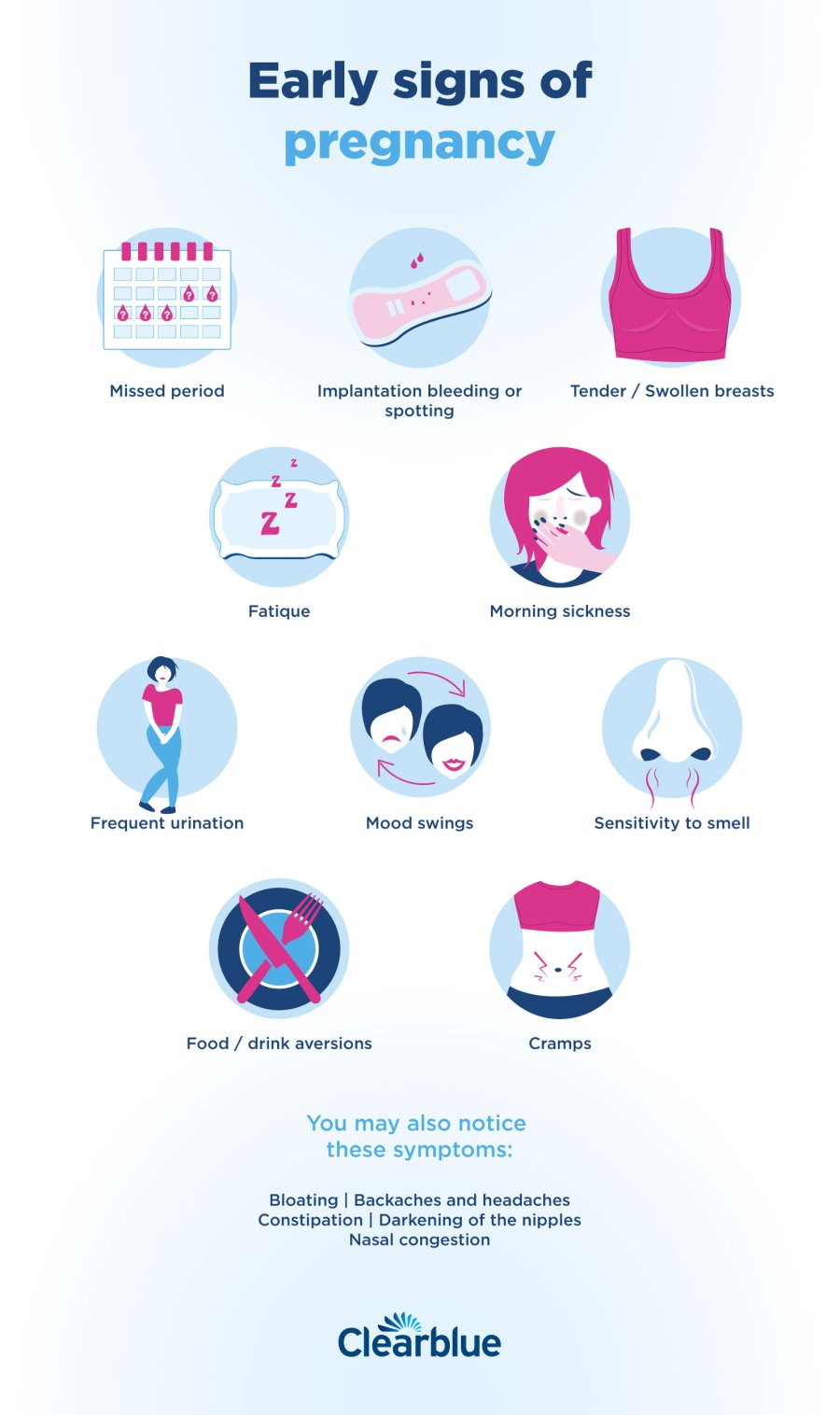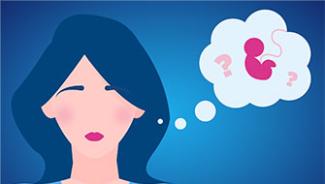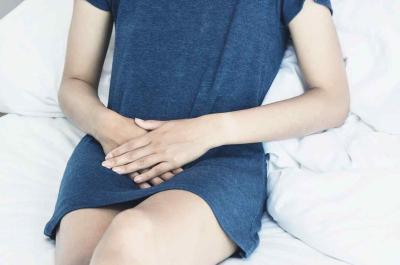
There are various symptoms that can indicate you might be pregnant. These early signs of pregnancy differ from woman to woman, and from pregnancy to pregnancy.
If you are pregnant, you may notice one or more of these early symptoms :
- missed period
- fatigue or tiredness
- breast changes
- nausea
- frequent urination
- food aversions or food cravings
Don't worry, you are unlikely to get them all at once. Equally, you shouldn't worry if you don't experience any of them. It's perfectly possible to be pregnant without noticing any of these signs of pregnancy. Whether you get any of these first signs of pregnancy or none of them at all, the only way to find out for sure whether or not you are pregnant is to take a pregnancy test.
What are the early signs of pregnancy?
1. Missed period
A missed period is often the first sign you’re pregnant, that is if you have a regular menstrual cycle.
If your menstrual cycle has been fairly regular for years, and suddenly your period is late, then it’s a good idea to get a home pregnancy test to check whether you are pregnant or not. Should the test come out negative, then it’s possible that there is another reason behind your missed period.
If your cycles aren't regular, you may notice other early pregnancy symptoms before you notice a missed period.
2. Spotting or implantation bleeding
You may notice some light bleeding or spotting around the time your period is due. This is known as implantation bleeding and happens when the fertilized egg implants in the lining of your womb when you’re pregnant. Although implantation bleeding can happen around the time your period is due, there are ways to spot it:
- Implantation bleeding lasts approximately 1-2 days, rather than 3-7 days as it would with your period.
- It’s light in color, so light pink or brown, not bright red like during your period.
- You might experience light cramping.
Although most of the time implantation bleeding doesn’t signal that there is anything wrong with your pregnancy, if you notice any blood and are concerned, see a doctor as there is no way to know how much bleeding is safe if you’re pregnant.
3. Breast changes
Your breasts might swell or even go up a cup size. They may also feel tender or highly sensitive. The veins on your breasts may become more noticeable and your areola (nipples) may darken.
4. Fatigue
You are likely to feel unusually tired in the first few weeks of pregnancy. This could be due to the rising levels of progesterone in your body as it maintains the lining of your womb to help support the pregnancy.
5. Nausea
You could start feeling sick, and even vomit; this is a classic pregnancy symptom you may experience between the 2nd to the 8th week of pregnancy. This usually passes by the 16th week. Although this is often called “morning sickness”, it can happen at any time of the day or night – and can even affect you all the time.
6. Hyperemesis gravidarum
Around one in 100 pregnant women suffers from hyperemesis gravidarum. Normally continuing well past the first trimester (12 to 13 weeks), hyperemesis gravidarum causes vomiting so often and severe that no food or liquid can be kept down. Usually, the condition can be treated and only in very rare cases will cause complications for the pregnancy, but please seek a doctor’s advice if you are suffering from severe sickness.
Ms. Emma Kirk:
Hyperemesis gravidarum is extreme nausea and vomiting and can be potentially life-threatening. Symptoms include prolonged episodes of vomiting, dehydration, having ketones in your urine and weight loss. Hospital treatment may be needed. Many units now offer treatment on a day case basis, but in severe cases admission may be needed. Treatments include intravenous fluids and anti-sickness medication.
7. Frequent urination
About 6 to 8 weeks after conception, one of the symptoms of pregnancy you may experience is the need to urinate more frequently. This is due to your uterus (the medical term for your womb) growing larger and pressing on your bladder. At the end of the first trimester, your uterus rises up into your abdomen which will take some of this pressure off your bladder.
8. Mood swings
Your changing hormones may cause some mood swings in the early stages of pregnancy – you could even find yourself crying without really knowing why.
9. Food aversions or food cravings
You may stop liking certain things such as tea, coffee or fatty food and might start to crave things you don't normally like. You might feel queasy when you smell certain things too – like coffee, meat or alcohol.
10. Cramps
You may get cramps in your abdomen in early pregnancy as your womb starts to expand. Your ligaments will also stretch as your bump grows, but hormones can also cause constipation or trapped gas that also add to the cramping sensation.
Other pregnancy symptoms
You may also notice other symptoms of pregnancy, such as:
-
11. Bloating: Bloating in early pregnancy is caused by hormonal changes during early pregnancy that can make you feel bloated.
-
12. Headaches and backaches: Backaches and headaches are quite common in pregnant women.
-
13. Constipation: The changes in your hormones can impact your digestive system, making it slow down, so you may feel constipated.
-
14. Darkening of the areolas: You may notice the areolas around your nipples darken.
-
15. Nasal congestion: Again, hormone levels increase, and you also have increased blood production, which can cause the mucus membranes to swell in your nose.

When do pregnancy symptoms usually start?
To understand more about pregnancy symptoms and when they happen, let’s talk about the timeline for a pregnancy:
- Day 1. This is the first day of your period. Although you are not pregnant yet, most pregnancies are counted from this day.
- Around day 14 you release an egg (when you ovulate in your cycle can vary depending on your cycle length).
- Within 24 hours of ovulation. If you had sex in the past few days without using contraception, the sperm fertilizes the egg.
- About 7 to 9 days after ovulation. The fertilized egg implants into the lining of the womb. You may have implantation bleeding (see below) around this time.
- You are now pregnant.
In the first two weeks of pregnancy, since you have not yet ovulated you are not actually pregnant, so you won’t notice any pregnancy symptoms before conception. When it comes to early signs of pregnancy post-conception, some women report noticing symptoms at different times. For example, some notice pregnancy symptoms about a week after conception—when the egg implants into the uterine wall, causing implantation bleeding (light spotting)—others notice later, usually with a missed period.
Can early signs of pregnancy be mistaken for PMS?
If you are waiting for your period to arrive, you may even notice a few early pregnancy symptoms like tender breasts, fatigue, mood swings, and strong chocolate cravings, but are you pregnant or is it just PMS?
There is some overlap between early symptoms of pregnancy and PMS, for example
- Tender breasts
- Mood changes
- Fatigue
- Nausea
- Cravings
- Cramping
However, if you suspect you may be pregnant and don’t want to wait for the day of your expected period, you can take an early detection pregnancy test.
What does your stomach feel like when you’re pregnant in the beginning?
You might notice some light cramping around implantation. Hormonal changes in early pregnancy may make you feel a little bloated or constipated too, but at this stage of your pregnancy, you wouldn’t feel any movement due to the fetus, as it is just an embryo (you would only feel movement from the baby from weeks 16 to 24 in the second trimester).
Frequently asked questions
What are the first physical signs of pregnancy?
You may notice some spotting from implantation bleeding about 1-2 weeks after ovulation.
How early do pregnancy symptoms start?
Most women notice a missed period first, but some women might notice some spotting due to implantation bleeding a little bit before their period is due, depending on their cycle.
What are some unusual signs of early pregnancy?
You might experience some unusual signs of pregnancy like:
- Nosebleeds
- Acne
- Stronger sense of smell
- A metallic taste in your mouth
- Vaginal discharge
- Shortness of breath
- Congestion.





